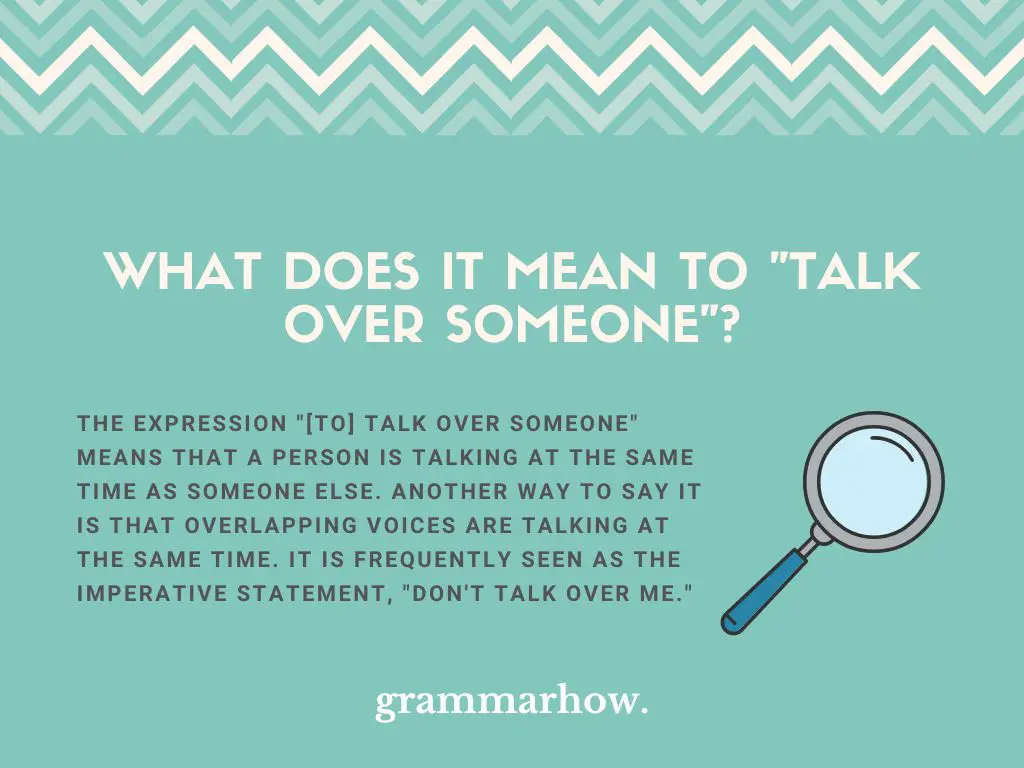One of the many interesting things about the English language is how some things can be taken literally while others cannot. One example of this is the expression “to talk over someone”. Read on to find out what this phrase means and more!
What Does It Mean to “Talk over Someone”?
The expression “[to] talk over someone” means that a person is talking at the same time as someone else. Another way to say it is that overlapping voices are talking at the same time. It is frequently seen as the imperative statement, “Don’t talk over me.”

If you’re encountering the expression “[to] talk over someone” for the first time, you may think that it is a strange one. The word “over” is a preposition that means “to be above something else”. The verb “talk”, however, isn’t a physical thing.
To “talk over someone” means that a person is talking at the same time as someone else. “Talk over” is used because the person is intentionally talking at the same time in order to overpower the other person speaking.
It frequently becomes a competition of which voice is louder than the other.
The phrase is often seen in the form of the imperative statement, “Don’t talk over me.” This means that the person being talked over is asking the other person not to talk over him/her/them.
Is Talking over Someone Disrespectful?
Yes, talking over someone is often considered disrespectful or rude. It is a form of interrupting someone by speaking at the same time as them, and it frequently becomes a contest of who is louder than the other. However, there are also certain cases when it isn’t considered rude.
In most cases, talking over someone is considered rude.
This is because when you talk over someone, you essentially interrupt them by speaking at the same time. You are trying to overpower their voice with your own.
However, there are also certain cases when it isn’t considered rude. Take the following situation, for example:
- The poor substitute teacher tried to talk over her incredibly rowdy students, to no avail.
In the above situation, it is the teacher who is the wronged party. Her rowdy students are the ones being disrespectful. The teacher is only trying to do her job and teach.
How to Use “Talk over” In A Sentence
You can use the words “talk over” to mean either of the following: “to talk over someone” or to “talk it over”.
The phrase “to talk over someone” can be used as an imperative statement, as follows:
- Don’t talk over me.
- Don’t talk over your father.
- Please don’t talk over me.
- Please don’t talk over your mother.
It can also be used in the past tense:
- He talked over me, so I slapped him.
- The little twerp talked over me!
Or in the present tense:
- She talks over people she thinks are rude, because they don’t deserve to be listened to.
It can also be used in the past continuous tense, such as in the following examples:
- He was sent to detention for talking over his English teacher and mocking her accent.
- She was suspended for talking over her principal while he was berating her for wearing a revealing outfit.
- He was a sexist prick, so I feel that she was justified in talking over him.
It should be noted that “to talk over someone” is significantly different from the similar-sounding “talk it over”. While it is rude to “talk over someone”, to “talk it over” means to discuss things calmly and rationally:
- Let’s talk it over.
- We should talk it over before we decide anything.
To Talk over Someone – Synonyms
Below are some phrases that can be synonymous with the expression “to talk over someone”:
- to interrupt someone by speaking
- to raise his/her/their voice while someone else is speaking
- to overpower someone (with their voice)
- to speak out of turn while someone else is speaking
- to speak over someone
Final Thoughts
You can use the expression “[to] talk over someone” to describe a situation where someone is talking at the same time as someone else. It is usually (but not always) done in a rude manner. It is also frequently seen as the imperative statement, “Don’t talk over me.”

Martin holds a Master’s degree in Finance and International Business. He has six years of experience in professional communication with clients, executives, and colleagues. Furthermore, he has teaching experience from Aarhus University. Martin has been featured as an expert in communication and teaching on Forbes and Shopify. Read more about Martin here.

